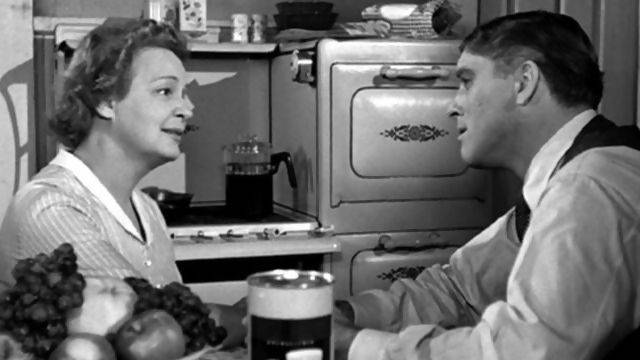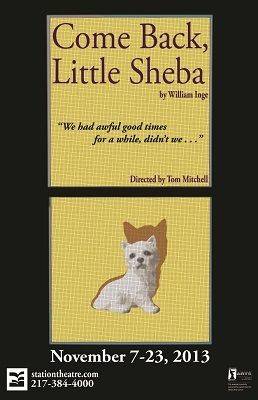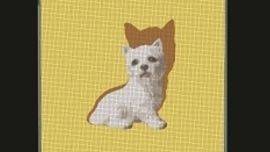
As a child, I remember watching the film adaptation of William Inge’s Come Back Little Sheba and seeing Shirley Booth as she clutched the collar of her chenille robe and leaned out her screen door. She pathetically cried for her beloved lost pet, Sheba, to come home; and even as a child, I knew that dog was long gone. It was one of the first truly sad film images I remember, largely due to Booth, embodying as she did a longing for something better. Seeing your life wither and fade is no picnic, and realizing the precise moment you lost everything is even worse. Inge’s plays are a meditation on our longing for a past connection, intimacy, or fulfillment that may never return, and The Celebration Company at The Station Theatre’s current production of, Come Back, Little Sheba is filled with that wistful hope for a return to past happiness. Lola and Doc (the Booth character and her husband) both see the moment their lives went wrong and are haunted by this through their observations of young love in bloom, courtesy of Marie, their youthful boarder and her sweetheart, Turk. It is a powerful and melancholy piece.
I recently had the pleasure of interviewing the production’s director, Tom Mitchell, and actors Lincoln Machula and Debbie Richardson (who play Doc and Lola, respectively) about their involvement with this production. Mr. Mitchell is a U of I theatre faculty member and former chair of the department; he also directed last year’s Krannert production of Dracula and The Station summer production of Freud’s Last Session. I began by asking him the reasons for selecting this piece.
********
Smile Politely: You are doing a classic work that is both challenging and less canonically recognized than other works of its era. As a director, what appeals to you about this particular piece?
 Tom Mitchell: I am a native Kansan, as was William Inge, so I recognize the characters he writes about. In particular, the unspoken loneliness of his characters has always rung true to me. Unlike Tennessee Williams, who created characters whoeloquently expressed their emotion, William Inge created characters who eloquently express their emotions in silence. Come Back, Little Sheba is a very concise and direct play. It zeroes in on the unspoken sorrow in the lives of Doc and Lola. The plot takes us to a point at which their long-buried sorrow is unleashed in a destructive torrent. Finally, we see the characters begin to pick up the pieces—without any promise of a happy ending.
Tom Mitchell: I am a native Kansan, as was William Inge, so I recognize the characters he writes about. In particular, the unspoken loneliness of his characters has always rung true to me. Unlike Tennessee Williams, who created characters whoeloquently expressed their emotion, William Inge created characters who eloquently express their emotions in silence. Come Back, Little Sheba is a very concise and direct play. It zeroes in on the unspoken sorrow in the lives of Doc and Lola. The plot takes us to a point at which their long-buried sorrow is unleashed in a destructive torrent. Finally, we see the characters begin to pick up the pieces—without any promise of a happy ending.
SP: Some critics see William Inge’s work focused on protagonists struggling with tension in their romantic/sexual relationships. In Come Back, Little Sheba, what are the key emotional themes your production explores?
Mitchell: In the play we learn that, in youth, Doc and Lola gave into sexual desire and as a result, were cut off from a bright and happy life. The small-minded morality of the Midwest led them to cover up Lola’s pregnancy, and as a result, they lost their baby. Twenty years later, Lola tries to relive the freedom and Joy of her early romance through Marie, a college student boarder, and her boyfriend Turk. Doc, on the other hand, sees Marie as an idealized virgin beauty, free of the pain and loss that he experienced in his younger life with Lola. Confronting the youthful sexuality of Marie stirs feelings that lead Doc to an alcoholic relapse and throws the tenuous balance of the Delaneys’ life crashing down.
SP: How does the intimacy of The Station’s space enhance this piece?
Mitchell: This is a play about human experience, and The Station foregrounds that experience by bringing the audience face-to-face with the actors. Lincoln Machula and Debbie Richardson fill their characters with the complex thoughts and feeling that make up human experience. At The Station, we join them in the intimacy of the kitchen as they make breakfast, by the radio as they recall days gone by, and at the front door as they plaintively call for their lost “Little Sheba.”
********
Actors Lincoln Machula and Debbie Richardson have been familiar faces on various Champaign-Urbana stages for a number of years. In fact, they’ve played onstage couples a number of times, including turns at The Station in Absurd Person Singular, Cat On a Hot Tin Roof, and A Body of Water. I chatted with these community theatre veterans about what attracted them to this production.
********

Smile Politely: What attracted you to this project?
Lincoln Machula (pictured, left): I saw that Tom Mitchell would be directing it, and I hadn’t worked with him before. I am glad to have this chance to work with him now. Also, I’m a fan of Inge’s work. I played Dr. Lyman in Bus Stop years ago, and I saw Picnic performed in Springfield.
Debbie Richardson: I wasn’t even planning to audition because I really didn’t know anything about the show and was enjoying a little break. Then Lincoln sent me a message asking if I was going to audition. I watched the movie with Shirley Booth one night and fell in love with the character Lola.
SP: What is the most appealing aspect of your character, and what is the aspect you find most challenging to connect with?
 Richardson (pictured, right): Lola’s strength. She has stood by Doc under some pretty adversecircumstances. She loves him so much, and she wants desperately to make things work. I also love how she interacts with other people. She is very much like me in some ways. She is upbeat, patient, tolerant, she loves young people, and she loves her little doggy. She is just sweet and endearing. That said, the aspect you find most challenging to connect with is that she, at times, can be a little naive and idealistic.
Richardson (pictured, right): Lola’s strength. She has stood by Doc under some pretty adversecircumstances. She loves him so much, and she wants desperately to make things work. I also love how she interacts with other people. She is very much like me in some ways. She is upbeat, patient, tolerant, she loves young people, and she loves her little doggy. She is just sweet and endearing. That said, the aspect you find most challenging to connect with is that she, at times, can be a little naive and idealistic.
Machula: I love Doc. He’s got a life full of regrets he’s trying to deal with. He’s delusional, alcoholic, grasping his sobriety with white knuckles. He’s quiet and shy and feels things deeply. He loves Lola and wants to have a better life and be a good man, but all the most compelling motives in the world can’t keep a drunk from drinking. There’s nothing anyone can do for him. He has to find a new bottom to hit, find clarity, and come to terms with the past. I get to play all of that and chew up some scenery. In all humility, it hasn’t been difficult for me to connect with the man. I hope I do him justice.
SP: How have you gone about preparing for your interpretation of your role? Have you seen the film or other productions?
Machula: Well, Burt Lancaster played Doc in the movie, so of course it’s right in my wheelhouse. Most people can’t look at me and not think of Burt Lancaster, especially with my shirt off. There is another film with The Right Honourable Lord Olivier as Doc, so if there’s anything I can steal from him, I will. I’ll watch them both again. I think it’s all there in the text, though, the black letters. Inge includes tons of description in the stage directions. I’ve known a few men like Doc–or rather men who possess aspects of Doc’s character–from which to construct an amalgamation.
Richardson: I honestly connected with Lola right away during our first read-through. I did watch the movie with Shirley Booth, but I am trying to bring my own interpretation of the role and trying not to base it on another person or character.
********
William Inge’s powerful drama Come Back, Little Sheba will open at The Station Theatre on Thursday, November 7 and run through Saturday, November 23. For reservation information and ticket prices, visit the Station’s recently refurbished website.








